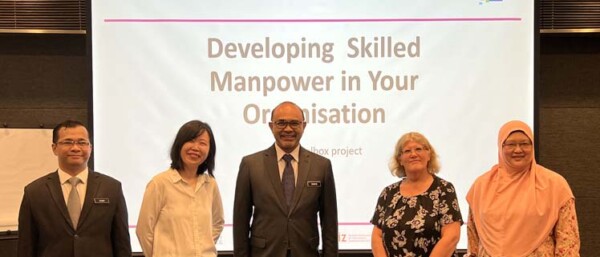
Strengthening collaboration between private sector and technical and vocational education and training in Malaysia
Over the last ten years the world of work has changed dramatically. Digital transformation has accelerated, and consequently new job roles have been introduced that didn’t exist a decade ago. As a result, the skills needed by employers have evolved.
To respond to this challenge, the British Council worked with People 1st International through the EU-funded VET Toolbox project, to support the Manpower Department at the Ministry of Human Resources to benchmark the effectiveness of the Malaysian VET sector’s engagement with the private sector with a focus on training for low-paid jobs and utilization of digital technology in jobs and training.
The analysis between international best practice and between the vision and progress made towards Malaysia’s vision to raise the percentage of skilled workers in the labour force addressing the digital skills and adoption of technology in the low skills-low-income occupations, highlighted challenges in employer engagement.
Employers didn’t recognise the need for the skills training currently offered and reported they didn’t feel sufficiently engaged in the development and implementation process for TVET.
To tackle this, through engagement with employers four key challenges were identified, along with a series of recommendations.
- Engagement between the private sector and the VET sector is fragmented: Collaborative partnerships and engagement processes need to be built that deliver demand–led solutions such as real work experience as well as CPD for trainers.
- Utilisation of digital technologies is not reflected in ‘standards’: An accessible, relevant, flexible and inclusive framework is needed based on national occupational standards, such as the NTG digital standards for tourism.
- Provision of technical skills development to re-skill/upskill the existing workers is limited and does not encourage ongoing learning. Awareness of a modular process needs to be raised and regulatory, recognised prior learning need to be tied in as well as future skills to progression pathways.
- Awareness and engagement of industry in implementation models and resources required for a skills development ecosystem is currently low. A positive skills development environment needs to be created through collaboration of employers, TVET providers, trade unions and other stakeholders, using models such as skills academies.
In the immediate term, to begin the journey of making the TVET system demand-driven, practical guidance and support for employers was deemed critical to create skills analysis and training needs plans specific to their business growth.
To support this, a series of capacity building workshops were developed and delivered to enhance the knowledge and competencies of skills advisors within the Manpower Department at the Ministry of Human Resources so they could support employers to:
- Identify skills gaps
- Develop training plans
- Find suitable training providers
- Access funding
- Monitor progress and record achievements
Fully armed with new skills and approaches, the expert skills advisors will now play a central role in helping to transform the engagement with the private sector.
Forming part of a new Employer Skills Guidance Service, skills advisors will help employers to identify and implement skills development training. First to engage with the service are a theme park and a property management company. 14 qualified skills advisors will now be working across sites within the two businesses as part of a pilot before being rolled out more widely.
To help employers understand the benefits and considerations of working in partnership with a TVET provider, a guide was also developed for employers. The guide includes case studies from a range of employers in different countries, focusing on the key processes and tools they use in recruiting and training and shows employers how to manage the various processes which need to be undertaken to deliver a successful training programme.
With a roadmap developed as part of the project, the Manpower Department at the Ministry of Human Resources will be spearheading an action plan to build upon the progress made to further strengthen the public-private collaborations and transform the skills of the current and future workforce to support economic growth.
[1] VET Toolbox is a partnership of leading European development agencies – British Council (UK), Enabel (Belgium), Expertise France (France), GIZ (Germany), LuxDev (Luxembourg) and AFD (France). It is co-funded by the European Union and the German Federal Ministry of Economic Cooperation and Development (BMZ).



